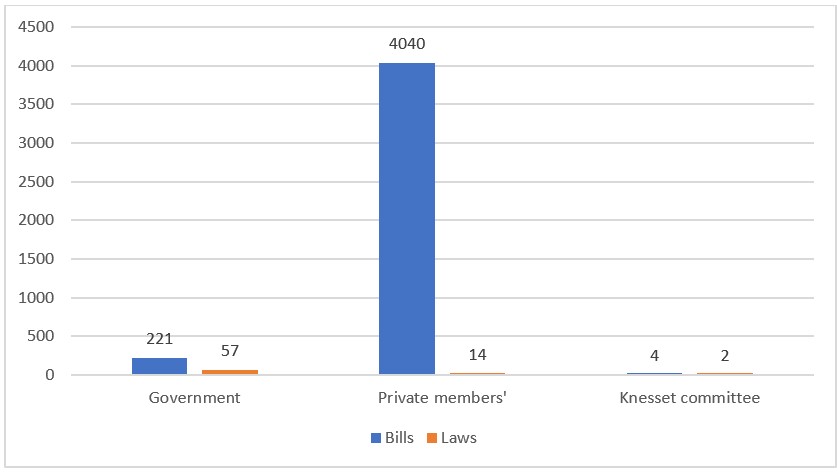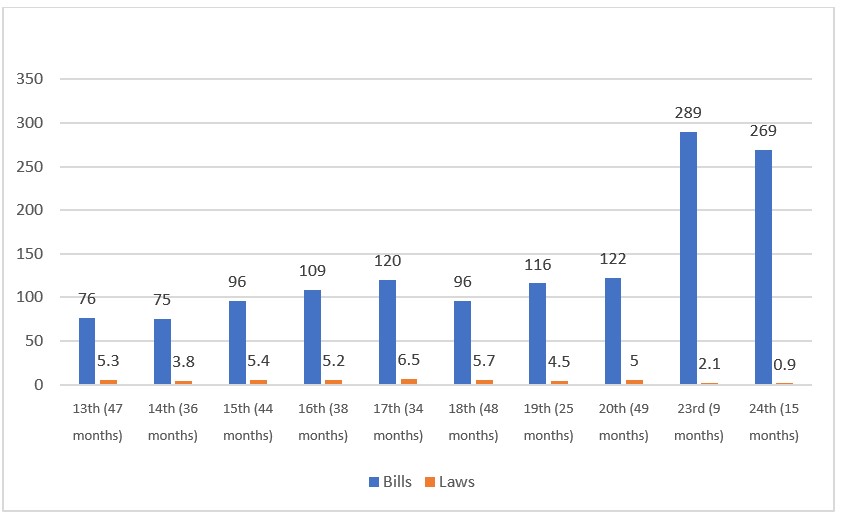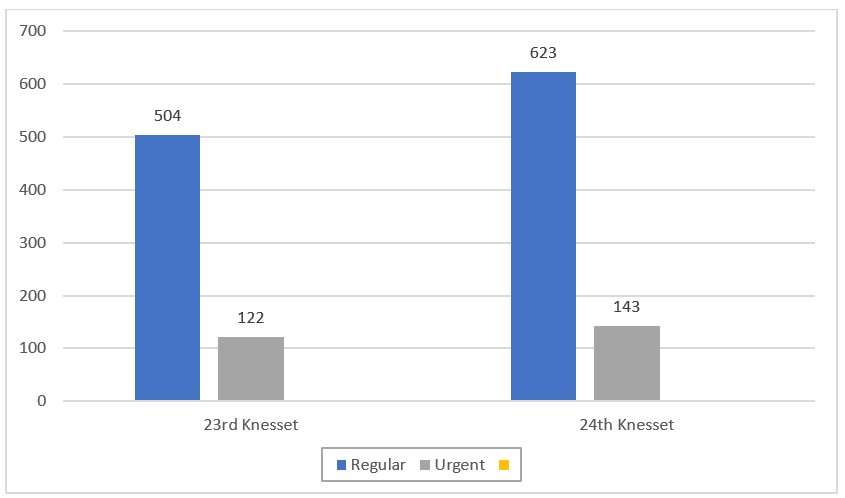The 24th Knesset in Numbers
The 24th Knesset has dispersed, around a year and a quarter since it was sworn in. The most prominent finding in the following review is that this Knesset continued the trend set by its predecessor: Both saw a dramatic increase in the number of private members’ bills put forward, and a dramatic reduction in the proportion of such bills that passed a third reading and became laws.

The 24th Knesset has dispersed, around a year and a quarter since it was sworn in. While this is a very short period of time, it is longer than the three previous Knesset’s terms, none of which served longer than a year. The most prominent finding in the following review is that this Knesset continued the trend set by its predecessor: Both saw a dramatic increase in the number of private members’ bills put forward, and a dramatic reduction in the proportion of such bills that passed a third reading and became laws ( which can also be attributed to the brief terms of these two Knessets, cutting short legislative procedures before their completion). This constitutes a severe exacerbation of a problem which has a significant effect on the functioning of the Knesset: Countless private members’ bills, the vast majority of which do not evolve into legislation. This is a waste of the resources of the members of the Knesset (MKs), their staffs, and professional teams at the Knesset, and comes at the expense of more substantive and meaningful work, particularly- oversight of the Government.
This review provides selected data on the work of the 24th Knesset (with comparisons to the 23rd Knesset), as of June 27, 2022.
Bills and Laws
According to the National Legislation Database, 4,266 bills were submitted in the course of the 24th Knesset’s term, of which only 73 were passed into law (1.7%). An in-depth look reveals huge differences in the proportion of bills legislated, depending on their source: While 26% of government bills (57 out of 221) and 50% of bills put forward by Knesset committees (2 out of 4) became law, only 0.3% of private members’ bills achieved this outcome (14 out of 4,040). In addition, the patterns of private legislation during the 24th Knesset were fairly similar to those of the 23rd Knesset , in which thousands of private members’ bills were also submitted, but only a tiny fraction of which ended in legislation.
Figure 1. Bills submitted and laws passed by the 24th Knesset

Source: National Legislation Database. Data extracted on June 27, 2022
A comparison with previous Knessets reveals that the 23rd and 24th Knesset are "way ahead" in terms of the average number of private members’ bills submitted. On the other hand, the 24th Knesset has the lowest average number of bills that were passed and became law, at around just one per month.
Figure 2. Monthly average of private members’ bills submitted and passed, 13th–24th Knesset assemblies*

*Not including the 21st and 22nd Knessets, which were not fully functional as no government was formed.
Sources: Knesset website; National Legislation Database; Government Legislation Report 2018, p. 23.
Parliamentary Questions
One of the oldest and most popular mechanisms for Knesset oversight of the government is the parliamentary question. This is preeminently an opposition tool, used by MKs to raise issues and pose questions to ministers. Data from the Knesset website reveal that, as of June 27, 2022, members of the current Knesset have raised 623 regular questions (of which 403 were responded to —64.6%), and 143 urgent questions (of which 127 were responded to —88.8%). No data was found regarding direct questions. By comparison, during the 23rd Knesset , which lasted for about a year, 504 regular questions were raised (of which 299 were responded to —59.3%) and 122 urgent questions (of which 115 were responded to —94.2%). Thus, we conclude that there was no real difference between the two Knessets in terms of their members’ diligence in raising questions, but there has been somewhat of an improvement in the rate at which ministers respond to regular questions.
Figure 3. Parliamentary questions submitted and responded to in the 23rd and 24th Knesset assemblies

Source: Data from the Knesset website on June 27, 2022
Motions for the Agenda
Another oversight mechanism available to MKs is that of motions for the agenda, through which they can put forward issues to be discussed by the Knesset plenum. There are two kinds of motions for the agenda: regular and urgent. At the beginning of each Knesset session, the Knesset House Committee sets the number of regular motions for the agenda to be raised in the plenum each week, and the number of motions that each faction can submit during each Knesset session, based on its size. Urgent motions are not included in these faction quotas, and each MK may submit one urgent motion for the agenda each week. The definition of a motion as “urgent” requires the approval of the Knesset presidium (comprising the speaker of the Knesset and his or her deputies). According to data from the Knesset website on June 27, 2022, Knesset members submitted 1,691 motions for the agenda during the 24th Knesset. In the course of the year of the 23rd Knesset, the equivalent figure was 1,447. In other words, with regard to the submission of motions for the agenda, there is once again no real difference in MKs diligence, given that the 24th Knesset lasted slightly longer than its predecessor.
No-Confidence Motions
According to section 28 of the Basic Law: The Government, the Knesset has the right to pass a vote of no confidence in the government, a vote that requires an absolute majority of the MKs. (61 or more) in favor. This vote is part of a full constructive vote of no confidence exist in Israel, meaning that it also serves as a vote of confidence in a successor government that has already announced the core tenets of its policies, its composition, and its division of roles among ministers. Knesset data reveal that in the course of the 24th Knesset, opposition factions submitted 60 motions of no confidence in the Bennett-Lapid government, while during the 23rd Knesset, opposition factions submitted 86 motions of no confidence in the Netanyahu-Gantz government.
